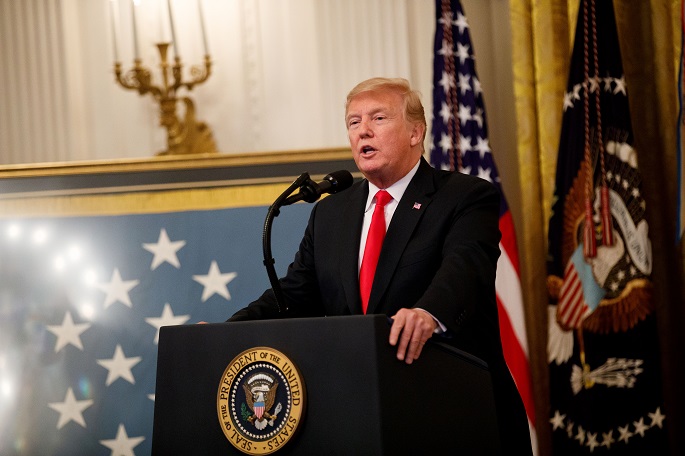Trump in isolation in front of world leaders calling for multilateralism
Published : 27 Sep 2018, 12:14
This year's UN annual debate has seen a clear division of worldviews between multilateralists and a unilateralist.
In front of world leaders who are strongly calling for multilateralism, U.S. President Donald Trump told the UN General Assembly that "we reject the ideology of globalism, and we embrace the doctrine of patriotism."
This is Trump's second speech at the UN General Assembly hall. Instead of trumpeting his "America First" policy, as what he did last year, Trump stated a similar point that "America will always choose independence and cooperation over global governance, control and domination."
However, few in the hall agreed with Trump's unilateral rhetoric as most of world leaders have recognized that multilateralism is the only possible response to global challenges.
TRUMP DEFIES INT'L INSTITUTIONS, TREATIES
"America is governed by Americans." When President Trump blurted out this statement, he was probably "unaware" that he was speaking at a multilateral platform to a global audience.
In his speech, Trump touched upon several global hotspot issues, defying international institutions and treaties.
In the Middle East, Trump lashed out at Iran by claiming that "we cannot allow the world's leading sponsor of terrorism to possess the planet's most dangerous weapons."
In May, Trump announced Washington's withdrawal from the landmark Iranian nuclear deal.
"We ask all nations to isolate Iran's regime as long as its aggression continues," he said in his speech.
As for the U.S. policy regarding Israel-Palestine peace, Trump said "America's policy of principled realism means we will not be held hostage to old dogmas, discredited ideologies, and so-called experts who have been proven wrong over the years, time and time again."
Trump also attacked the U.N. Human Rights Council and the International Criminal Court, and rejected a global pact on migrants.
"We will never surrender America's sovereignty to an unelected, unaccountable, global bureaucracy," he said.
MULTILATERALISM IS OVERWHELMINGLY SUPPORTED
In an opening address to the 193-member assembly, UN Secretary-General Antonio Guterres warned that "multilateralism is under fire precisely when we need it most."
From wars in Syria, Yemen and elsewhere, to issues of refugees, climate change, and terrorism, Guterres, after listing global challenges facing the planet, said "there is no way forward but collective, common-sense action for the common good."
"Our future rests on solidarity," he appealed. "We must reinvigorate our multilateral project."
Guterres' call was responded by several heads of state in the following debate. French President Emmanuel Macron, in his speech, strongly defended multilateralism and the Paris Agreement on climate change.
"I do not accept the erosion of multilateralism and don't accept our history unraveling," Macron said, while urging "dialogue and multilateralism" to resolve the world's crises.
Without multilateralism, Macron said, global wars would return. He cautioned that "nationalism always leads to defeat."
When talking about the Paris Agreement on climate change, the French president said: "We will no longer sign commercial agreements with powers that do not respect the Paris accord."
Iranian President Hassan Rouhani said "confronting multilateralism is not a sign of strength; rather, it is a symptom of weakness of intellect."
The current administration of the United States seems determined to render all international institutions ineffectual, said Rouhani.
Speaking of the Iran nuclear deal, he said that "we are pleased that the international community did not acquiesce to the U.S. illegal and unilateral withdrawal from that agreement."
To the problems facing the international community, multilateralism stands alone as the only viable response, said Maria Fernanda Espinosa Garces, president of the General Assembly's 73rd session.
A ZERO-SUM WORLDVIEW OF TRUMP
Right after Trump delivered his speech, several U.S. experts commented that such a speech is indicative of Trump's zero-sum worldview and will undermine world stability and prosperity.
Dan Mahaffee, senior vice president and director of policy at the Center for the Study of the Presidency and Congress, told Xinhua that "in his speech, President Trump drew on his own belief in American sovereignty."
"In this framework, international institutions present a threat to American sovereignty, especially at a time when issues like immigration, trade, and the role of frameworks such as alliances and multilateral institutions limit American freedom of action," he said.
"It does shift significantly away from the benefits that the United States has achieved in its partnerships and alliances with other countries as it better reflects President Trump's zero-sum worldview," he noted.
In the view of Kyle Ferrier, an analyst for the Washington-based Korea Economic Institute, Trump's speech attempted to reframe his "America First" foreign policy into something that would be more universally understandable -- patriotism.
"Dressing up his foreign policy, however, is not going to allay widespread concerns about U.S. withdrawal from global governance," said Ferrier.
Christopher Galdieri, assistant professor at Saint Anselm College, also told Xinhua that "since his first flirtations with running for office, Trump has seen the U.S. as getting the short end of the stick when it comes to relations with other countries, particularly in the realms of trade deals and multilateral agreements."
"Trump appears to view relations with other countries in zero-sum, bilateral terms -- there should be two parties to agreements, and the U.S. should get the better of the other country in the deal," he said.


